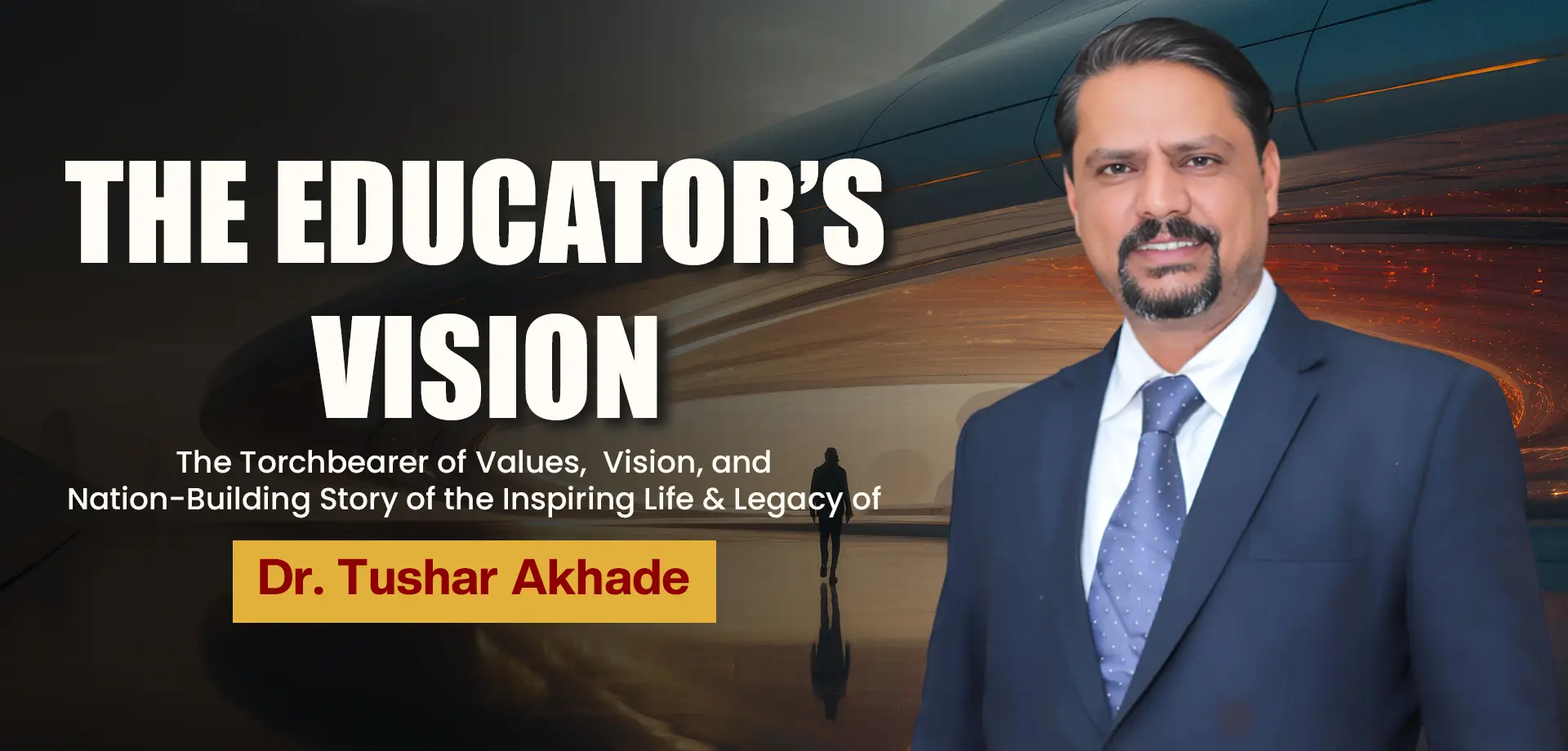
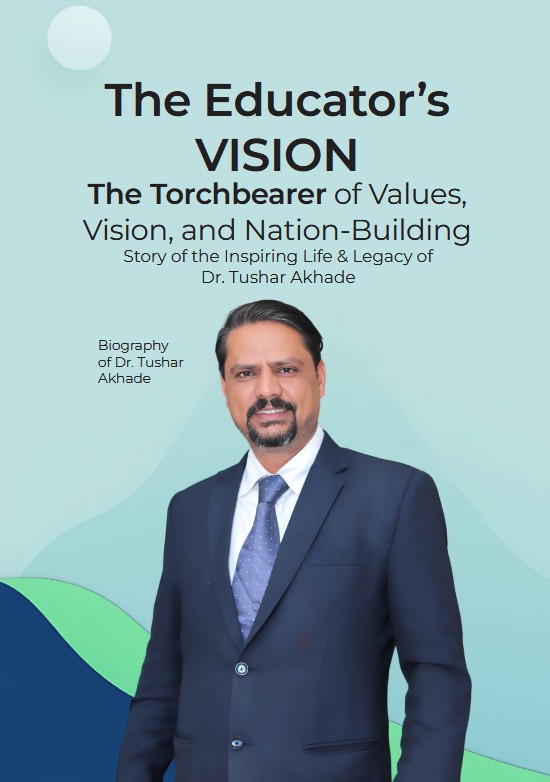
“Educate a mind, and you shape a career. But awaken a conscience, and you shape a civilization.”
Introduction
Dr. Tushar Akhade is a distinguished educationist, visionary school principal, and respected community leader whose life stands as a compelling testament to the transformative power of values-based education. Born into a modest shepherd family in the serene hill town of Mahabaleshwar, Maharashtra, he ascended from humble beginnings through unwavering dedication, quiet resilience, and a profound sense of purpose. Over the course of more than two decades, he has not only built an institution from the ground up but has also shaped an entire generation—cultivating in his students not just academic excellence, but integrity, empathy, and character.
A steadfast proponent of holistic education, environmental stewardship, and literary engagement, Dr. Akhade embodies a rare synthesis of intellectual leadership and humanistic depth. His journey reflects a lifelong commitment to elevating education beyond the classroom—into the realm of moral development, cultural consciousness, and nation-building.
Phase 1 : The Roots of Life
“From the quiet hills of Mahabaleshwar to the corridors of purpose, my journey began not with privilege, but with perseverance—rooted in simplicity, nurtured by struggle, and guided by the unwavering faith of my family.”
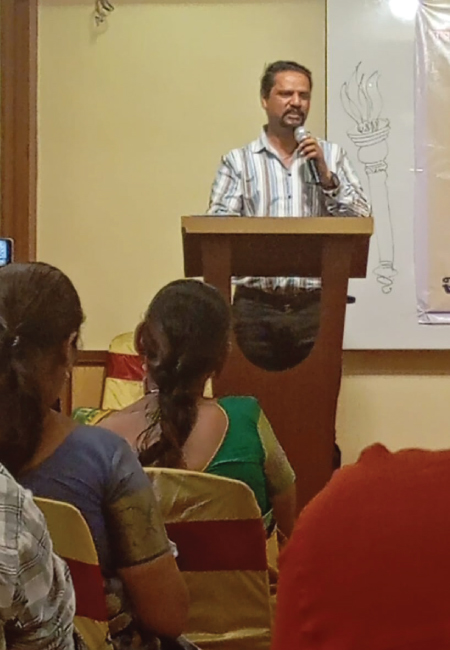
Born on the 29th of May, 1981, in the picturesque hill town of Mahabaleshwar nestled within Maharashtra’s Satara district, Dr. Tushar Akhade’s early life was grounded in simplicity, rooted deeply in the traditions of rural India. His story begins in the lap of the Sahyadri hills, where mist-kissed mornings and crimson sunsets form the backdrop to a life shaped by pastoral rhythms and familial unity.
Dr. Tushar Akhade hails from a proud and industrious shepherd community—a lineage that holds deep reverence for cattle rearing, agriculture, and living in harmony with nature. His household was one where the presence of cows and buffaloes was not only a livelihood but a way of life. These animals were not mere assets; they were part of the family. Milking before dawn, grazing on sunlit slopes, and the scent of hay and earth—these were integral elements of his childhood landscape.
The Akhade family was a large and closely-knit unit, comprising his father, Mr. Mahadev, a man of quiet strength and dignity; his mother, Mrs. Ranjana, a pillar of warmth, wisdom, and devotion; and four children—two sons, including Dr. Tushar Akhade, a daughter, and another brother. In this environment steeped in love, discipline, and mutual support, the foundations of Dr. Tushar Akhade’s character were formed.
Education was a prized aspiration in the Akhade household, despite the constraints and distractions of rural life. All four siblings undertook their early education in Mahabaleshwar itself, attending local schools where Marathi was the medium of instruction. For Dr. Tushar Akhade, these formative years were shaped not just by textbooks and teachers, but also by the unspoken lessons taught through the toil of his parents and the values they exemplified—honesty, humility, and hard work.
Though the town of Mahabaleshwar is often known for its lush strawberries and tourism, for the Akhade family it was the land of heritage, identity, and dreams. It was in the classrooms of Marathi-medium schools and the humble confines of a shepherd’s home that Dr. Tushar Akhade’s lifelong journey of purpose began quietly but resolutely.
The environment was not without its challenges. Balancing early morning chores with academic commitments was no small feat. Yet, these experiences ingrained in him a sense of discipline and resilience that would later underpin his professional pursuits. The simplicity of village life, the shared meals, the silent language of nature, and the hardships borne with dignity—each left an indelible impression upon his soul.
Phase 2 : The Inspiring Academic Journey
“I did not inherit the privilege of polished words or perfect guidance—but I carved my path through perseverance, and turned my greatest fear into the very language through which I now empower others.”
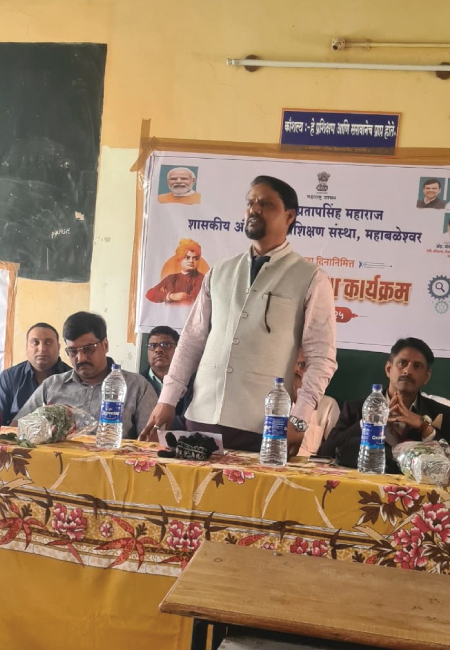
In the softly murmuring hills of Mahabaleshwar, where the rhythm of life was dictated more by the grazing of cattle than the ticking of classroom clocks, young Tushar Akhade’s academic journey began—not in grandeur, but in gritty resolve. His earliest school days unfolded within the walls of a modest municipal school, a structure that stood less for its facilities and more for its purpose: to bring learning to children who might otherwise be denied it. It was there, with chalkboard dust in the air and a curious light in his eyes, that the first seeds of his intellectual pursuit were sown.
The school had no grand façade, no polished corridors echoing with English rhymes. It was basic, functional, and often short on resources. But what it lacked in material luxury, it compensated for in foundational value. This was the environment that nurtured Dr. Tushar Akhade’s earliest curiosity. His notebooks were sometimes hand-me-downs, and his pencils often stubbed to their final inch, but his ambition—quiet and determined—remained unshaken.
As he advanced in age and class, he moved to Giristhan Prashala, where he studied from the 5th standard through to the 10th. Giristhan wasn’t vastly different in terms of infrastructure, but it did offer a stronger academic structure, and it was here that his personality began to take more definite shape. He was no longer just a curious student—he was becoming someone who sought to understand the world, someone who asked questions that went beyond the textbook.
It was during these years that he began to appreciate the value of the Marathi language, through which his cultural and emotional worldview had been shaped. Yet even then, he could sense the growing weight of another language—English—that loomed on the horizon like a necessary storm.
He completed his 12th standard in the Arts stream at the same institution, choosing the path of literature and humanities over science. But this decision wasn’t purely out of personal preference—it was also the result of a gap in awareness. Dr. Tushar Akhade harboured a noble dream in his teenage years, one that sparkled with discipline, honor, and service: he wanted to join the National Defence Academy. The military’s structured life, its service to the nation, its disciplined dignity—all of it had enchanted him. But he soon discovered, to his dismay, that entry into NDA required a background in science, specifically Physics and Mathematics. These were subjects he hadn’t taken, simply because no one around him—neither teachers nor peers—had ever guided him toward that path.
In a village where education was respected but rarely strategically pursued, career counselling was a luxury, and mentors were few. Dreams like his, despite their fervours, often ran aground on the reefs of circumstance. “Had someone told me earlier, perhaps I would’ve taken a different stream,” he would reflect years later not with regret, but with the understanding that sometimes, fate speaks through detours. With the NDA dream gently shelved, he turned toward a different kind of service the realm of education.
Phase 3 : Steps into the Professional Life
“The first step into professional life is not a walk toward a career—it is a commitment to purpose, discipline, and the quiet promise to grow beyond oneself.”
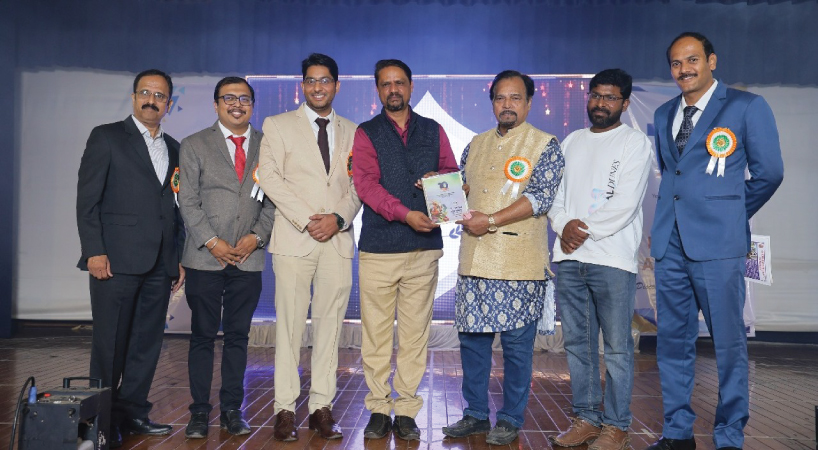
After completing his Bachelor of Education degree, Dr. Tushar Akhade made a seamless and wholehearted entry into the teaching profession—a calling that would not only define his career but shape the very identity of who he was to become. While many enter the profession seeking stability or routine, for Dr. Tushar Akhade, teaching was never merely a job. It was a canvas upon which he would paint years of passion, trials, triumphs, and transformation.
His professional life began in June 2005, when he accepted the role of Assistant Teacher at Panchgani International High School—a residential school nestled amid the serene hills of Panchgani. The decision was a continuation of a journey that had begun in those same hills during his college days. Yet this time, he returned not as a student, but as a mentor.
The school environment he stepped into was dynamic and demanding. As a residential institution, it required teachers to be more than mere instructors—they were expected to be mentors, caretakers, friends, and sometimes even surrogate parents. For someone like Dr. Tushar Akhade, who had always valued relationships and the emotional resonance of teaching, this proved to be a natural fit.
His early years from 2005 to 2010 were marked by unrelenting dedication. While he had begun his Master’s in English Literature concurrently, it was clear that his heart beat for his students. His focus was unwavering—on their development, their understanding, and most importantly, their confidence.
Working within a diverse student body, he quickly recognized the varying levels of comprehension, particularly in English, and committed himself to individualized attention. He provided one-to-one academic support for students who struggled, not just with course material but also with self-esteem. For Dr. Tushar Akhade, teaching was never about grading performances—it was about nurturing growth.
He began tutoring students in both one-on-one and small group sessions, patiently adapting his methods to meet different learning needs. He believed that education was not a uniform Mold into which every child must fit, but a bespoke journey that required tuning, observation, and empathy. His sessions weren’t confined to textbooks and syllabi—they were conversations, explorations, and bridges between what students knew and what they could become.